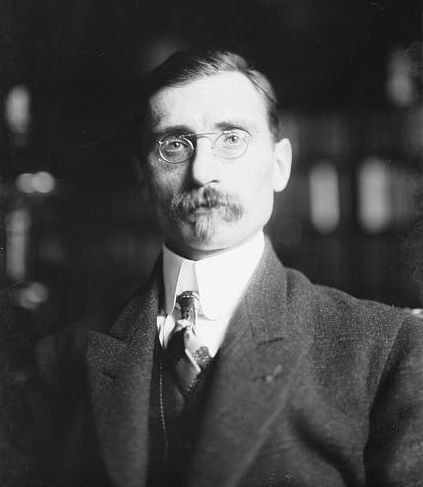Editor’s note: The following is extracted from Ancient Rome and Modern America, by Guglielmo Ferrero (published 1914).
In the early days of the year 70 B.C., a deputation from the cities of Sicily arrived at Rome and sought an interview with a young Senator, who was already famed for his eloquence, by name Marcus Tullius Cicero. What could be the object of the Sicilians’ visit to Rome and to the modest house of the young Senator, whose strict probity and modest means made it impossible for him to receive his visitors in a sumptuous palace? Justice was the object of their visit. For three years, from 75 to 73 B.C., Sicily had been governed by a young pro-prætor, a scion of an illustrious house, who had powerful friends amongst the party in power: Caius Cornelius Verres. Daring, imprudent, covetous, fond of art and its products and of the pleasures of life, emboldened by a rapid and fortunate career, the young pro-prætor had certainly much abused his power in the provinces and had too readily turned to account the corrupt notions of the times in the amassing of a huge fortune by all the means, licit and illicit, which a pro-prætor could use and abuse, though in doing so he had offended the interests and susceptibilities of others, and had made a great number of enemies. That is the only conclusion to be drawn from the fact that, after his departure, the cities, accustomed though they were to insolent and overbearing governors, decided in this instance to present an indictment and had recourse to the young Senator who five years before had been quæstor in Sicily, and who had left behind him in the island a great reputation for culture, generosity and honesty. When he left the island, this young Senator had himself said to the Sicilians in a speech delivered at Lilybæum: “If at any time you have need of me, come and fetch me.”
The Sicilians had remembered this promise. The laws of ancient Rome allowed any citizen to cite in the courts any other citizen whom he suspected of having broken the laws. Would Cicero cite Verres in Sicily’s behalf? The proposal of the Sicilian cities was a proof of remarkable confidence, but it was at the same time a dangerous honour. Verres was a rich man; he was powerful and had any number of helpers and supporters among the party in power. Of even greater assistance to Verres than the friendship of the influential was the feeling of community of interest amongst the dominant faction. This faction was the faction of Sulla, that is to say, the more conservative portion of the nobility, which, after a terrible civil war waged against the Democratic party, had succeeded in seizing the reins of government of the Republic. It was a faction composed of widely differing ingredients. It comprised not a few honourable and upright men, who would naturally wish the provinces to be governed humanely and uprightly. But great though the desire might be that the Empire should be governed well, still greater was the desire to preserve, together with the constitution imposed by Sulla on the Empire, the power bequeathed by him. At this juncture, the opposite party had been conquered but not destroyed, and its survivors were restlessly alert for every opportunity of injuring the dominant faction with all the arms provided by the constitution, amongst which one of the most dangerous was precisely the initiation of scandalous charges against prominent persons. Consequently, legal proceedings and scandals intended to discredit the State had, since Sulla’s time, been looked on with much disfavour by the dominant party, even honourable members of which, faced with the choice between the harm which one of these processes caused to the party and to the authority of the State and the injury to justice resulting from the escape of a powerful culprit unpunished, nearly always preferred the second.
In fact, for years past, the dominant party had strained every nerve to prevent these processes, thus encouraging the less honourable governors to abuse their authority. The result had been the rise in the public conscience of a feeling of uneasiness, discontent, and irritation, which the stories, often exaggerated, of the cruelty and violence of the governors served only to accentuate. And by none at that moment was this uneasiness more acutely felt than by Cicero. Cicero belonged to a family of equestrian rank—middle-class we should call it—from Arpino. He was a homo novus, a self-made man, to use a modern expression, because he was the first of the family to become a member of the Senate. He was not very rich and, though a man of intelligence and vigour, he was somewhat lacking in courage. Consequently, he was not the man to dare open defiance of the wrath, or a frontal attack on the interests, of the dominant caste; rather were these violent and terrible accusations so repugnant to his nature that he had never brought himself hitherto to assume the rôle of prosecutor in any action. He had always preferred the more humane part of defender. He was, however, an honourable man, with small affection—like all the equestrian order—for the faction and government formed by Sulla; and he was fully conscious of the obligation imposed on him by the promise which he had made so solemnly to the Sicilians. Besides, he was young—only thirty-six years old—and was still a man of secondary importance. A case of great public interest, which set all Italy talking, and in which he was the popular protagonist, might be of great service to his lofty and legitimate ambitions. In addition, things had been moving fast recently, to the detriment of the party in power, who were accused on all sides of outrage and corruption. The consuls for that year were Pompey and Crassus, who, though members of the Sullan party, had come forward as candidates with a Democratic programme, promising no less than that they would restore to the tribunes of the plebs those powers of which Sulla had stripped them. There was a feeling in the air which seemed to promise that just for once the infamies of a governor might receive condign punishment from outraged public opinion.
The young advocate realised that the decisive moment of his life had come. He agreed to prosecute Verres. But what crime or crimes should he lay to his charge? At this point emerges the first strange feature in the history of this strange case. The budget of charges, recriminations, and denunciations against Verres, which the Sicilians lodged with Cicero, comprised enough and to spare of crimes of every sort, some of which were actually of a capital nature. For instance, Verres was accused of having ordered Roman citizens to execution—which was a capital offence. But what did Cicero do? He carefully singled out the least serious charge and persuaded the Sicilians to lay an indictment de pecuniis repetundis—to demand, that is to say, that Verres should be condemned to pay one hundred million prezzi (twenty-five million francs) as a penalty for having levied unauthorised taxes. How are we to explain this forbearance? Cicero in his speeches against Verres denounces him as a monster and a wild beast. He launches the most terrible invectives against his villainies. There is no need, however, to interpret too literally his glowing periods. Not even Cicero could forget, while he was accusing Verres, that he himself and the man he was accusing belonged to the same class, and were members of the same aristocracy, which controlled the vast Roman Empire. However keen might be the indignation aroused by the misdeeds of Verres, not even the strictest section of the aristocracy would have approved too relentless a line of attack, or one which involved the accused in too serious danger. Personal hatred was a less powerful factor than the sentiment of caste and the interest each man felt in securing a mitigation of the severity of the laws in favour of his fellows, in anticipation of a similar privilege for himself when occasion might arise. Therefore Cicero acted wisely in his clients’ interests when he chose that charge which promised the least danger to the defendant; for he knew that otherwise the latter would have an easier task in escaping conviction.
The weakness of the attack, however, as always happens, emboldened the accused. Verres did not hesitate one moment to make a political matter of his case. He had recourse to all the most influential members of his party. He begged Q. Hortensius, who was the greatest orator and the cleverest advocate of the day, to defend him. In every possible way, he tried to enlist in his support party interests and caste consciousness. He represented the indictment as a machination of the Democratic party, of the opposition, to bring obloquy on the party which had been restored to power by Sulla. He, Verres, was the victim, in whose person it was hoped to strike a blow at the whole of the Conservative aristocracy, and at Sulla’s life work! This view of the matter was at this juncture not unconvincing, so that Verres, when he began the struggle, found himself supported by powerful friends.
His first move had for its object the elimination of Cicero as prosecutor. The Roman law, though it allowed anyone to constitute himself accuser of a citizen who had violated the laws, did not permit an unlimited number of people to get up and accuse a single individual. For, in that case, the law would have worked oppressively, cruelly, and unconscionably. The accusation had to be lodged by a single person; and if several persons asked to be allowed to accuse an individual, it was the duty of the authority to choose one of them as the accuser. Verres accordingly tried to find a rival for Cicero. A certain Quintus Cecilius Negro, a Roman citizen, but of Sicilian origin and a Hebrew by religion, who had been Verres’s quæstor in Sicily, appeared before the Prætor, declaring that he wished to prosecute Verres, and demanding the privilege over Cicero on the pretext that he had been insulted by Verres in Sicily. As a matter of fact, there had been a violent quarrel between them about a certain Agonis, a freedwoman of the temple of Venus at Eryx, who practised the profession reserved in the ancient world for the slaves of the temples of Venus.
So a preliminary trial was necessary to decide which should be the accuser, Cecilius or Cicero, and this trial took place in the early months of the year 70. Cicero made a powerful speech in which he clearly insinuated that Cecilius was playing a part with the connivance of Verres; that the former, if he were chosen to be the accuser, would conduct the prosecution in the way best calculated to secure Verres’s acquittal. He added in more precise terms that the case was of the greatest political importance, inasmuch as it was bound to prove definitely to the provinces whether there was or was not justice to be had in Rome; whether the subjects of Rome might expect to find their rights impartially defended in the courts of the Republic, or whether as the enemies of Rome and the adversaries of the dominant party were repeating on all sides-the aristocracy were nothing but a corrupt and rapacious association without bowels of mercy for the victims whom they tortured.
Cicero was successful in this first skirmish. He obtained recognition from the court as the prosecutor of Verres, and was granted one hundred and ten days in which to proceed to Sicily to collect the proofs of his accusation. He started at once.
At Rome, the struggle between the party with the purse and the Democratic opposition, encouraged by the support of the two all-powerful Consuls, waxed furious. Pompey and Crassus induced the Senate to restore to the Tribunes their ancient powers. They re-established the censorship and by the instrumentality of the two newly elected Censors, they ejected from the Senate many of the more contemptible of Sulla’s partisans. Marcus Aurelius Cotta proposed a reform of the courts which would have removed the latter almost entirely from the influence of the dominant party.
Naturally, these discussions, these laws, and these proposals served only to increase the general excitement; and of this excitement Verres took advantage to identify still further his own cause with that of the party in power. He placed at the disposal of the party the wealth he had well or badly earned in his province as well as his influence and his personality. The party on their side chose as candidates for the consulship Q. Hortensius, his defending counsel, and Quintus Metellus, who was a great friend of Verres; for the prætorship, Marcus Metellus, a brother of Quintus and no less than Quintus a friend of Verres. They opposed with all their force the law proposed by Cotta, which would have transformed the courts in a manner most unfavourable to Verres’s interests. The Democratic party in their turn took the Sicilians’ cause under their protection, to the extent of choosing Cicero, their illustrious advocate, as candidate for the ædileship.
Thus the elections of the year 70 promised to be bound up in the trial of Verres. They seemed likely to be the means by which the two parties would endeavour to influence public opinion in favour of the prosecution or of the defence. Unfortunately, when Cicero, after an absence of about two months returned to Rome from Sicily, with abundant matter in the shape of documents and proofs, he found the situation of the popular party, and consequently his action against Verres—for its fate was bound up in that of the party—gravely compromised by a rupture which had arisen between the two Consuls. There was no love lost between Pompey and Crassus. Each was jealous of the other. In putting themselves at the head of the Democratic party, they had been guided by ambition and political calculations. But they were both too rich, and had too many ties with, and friendships among, the dominant party—from which both of them came—to be able to infuse much zeal and sincerity into their services to the opposition. As a result, each had ended by attacking the other; and these attacks, after some months of activity, had paralysed the Democratic party, and restored boldness and confidence to the Conservative party, which was now resolved to wreck the law of judicial reform and to obtain Verres’s acquittal, the two triumphs at which it aimed.
When Cicero returned, the elections were imminent, and because of their imminence everyone was in a state of preoccupation and uncertainty. It would not have been prudent for either party to incur the risk of the trial before the elections. So the trial was postponed without any difficulty or opposition. It was the month of June; and, in the following July, the elections would, as usual, take place. Those for the consulship and prætorship were a great triumph for Verres. Quintus Hortensius and Quintus Metellus were elected Consuls; Marcus Metellus was elected Prætor. Verres had conquered all along the line! The evening of the day on which the Consuls were elected, Verres was publicly congratulated on the result near the Arch of Fabius by several members of the aristocracy; and one of them, Caius Curion, told him in so many words that “the comitia had acquitted him.” Cicero was naturally much upset; but he did not lose heart. He discontinued for some time working up his case, and devoted himself entirely to his election to the ædileship. The Democratic party had realised that, after their want of success in the elections to the consulship and the prætorship, a further failure in the shape of Cicero’s non-election would seriously compromise their chances in the prosecution of Verres. In fact, Verres and his friends were working like demons against Cicero, using against him all the resources of money, intrigue, and calumny. Those were days of anxiety and turmoil for Cicero, the days of the struggle, but, thanks to the energetic support on this occasion of Pompey, Cicero was elected.
The elections over, attention was again directed to the trial, the opening of which was fixed for the 5th of August; and the two parties began to sharpen their weapons for the decisive and supreme issue. There were two phases to a Roman trial; in the initial phase, the prosecutor had the first word, opening his case, and the defendant replied; the witnesses also were heard. Then followed a suspension of the proceedings, after which the prosecutor once more spoke and the defendant once more replied. Then the jury—for the Court was composed of a jury drawn by lot from the body of Senators and presided over by the Prætor—gave its verdict. Those in favour of acquittal wrote an A (absolvo) on the waxed tablet, those in favour of conviction wrote a C (condemno). Cicero’s intention was to abbreviate his opening statement as much as possible; then to bring forward a large number of witnesses whom he had brought from Sicily and collected in Rome, so as to make a complete history of the whole of Verres’s political life and administration. The charge against Verres was that he had extorted forty million sestertii from the provincials. But it would not satisfy Cicero to prove only this point. He wanted to show that Verres had been guilty of the countless rascalities which the popular voice attributed to him, beginning from the time of his first occupation of the office of quæstor; in short, to reconstruct with the help of witnesses and documentary evidence the whole of his public and private life. To strengthen the impression made by his case, he intended to bring the witnesses forward in groups corresponding to the different charges, and to introduce one group after the other, prefacing the introduction of each group with a short explanatory speech, in such a way as to focus the attention of the public each time on a definite and precise episode in Verres’s career.
This method of procedure on the part of the prosecution may seem to us barbarous and inhuman. We should think it atrocious if, even against the greatest of scoundrels, the prosecution instituted an inquiry into the whole of his life in order to punish him for, and to convict him of, a single offence. Against such methods, we should not expect anyone, however innocent, to be able to defend himself. And yet, so greatly do feelings and ideas change in the world—Verres and most of his friends had hopes of finding their best line of defence in this relentless prosecution. An all-embracing accusation, such as Cicero intended to make, might, it is true, annihilate a man; but it required much time, days and days of discussion. Now, time was the ally on which Verres and his friends counted most confidently. The trial began on the 5th of August; the 16th to the 31st of August were the dates fixed for the celebration of the games which Pompey had promised for years past in memory of his victories over Sertorius. During this interval, the trial would have to be suspended. Further suspensions would be necessary from the 4th to the 19th of September, because of the Roman games; from the 26th of October to the 4th of November because of the games of Victory; from the 4th to the 17th of November because of the ludi plebeii. Thanks to this abundance of games, then, there was a prospect, especially when Cicero’s wish to amplify the indictment was taken into account, that the discussion would be unduly prolonged. Other pretexts for postponement would surely not be wanting. In the meantime public interest would flag; and, if one could look forward to the new year, the presidency of the jury would pass to the new Prætor, Marcus Metellus, who was an intimate friend of Verres. With his connivance, it would be easy to find a way of bringing the prosecution to an end with a convenient acquittal. In fact, Hortensius advised Verres to let Cicero call as many witnesses as he wished, and to let them talk freely, without contradicting them and without being drawn into a discussion with them, but listening to them in austere and contemptuous silence.
The doubtful and decisive point, then, of this great struggle was this: whether greater success would attend Cicero in his efforts to move the public with his tenacious and insistent accusations, or Verres and his friends in their efforts to tire out that public with their passive resistance. At last, on August 5th, the trial, the preparations for which had occupied so many months, began. The public expectations and curiosity were immense. The struggles and intrigues of the parties had by now converted the trial into a political event. The Democratic opposition wanted Verres to be convicted, so as to inflict a humiliation on the dominant party and to be able to accuse it of countenancing the pillage of the provinces. The Conservative party wished for Verres’s acquittal so as to be able to assert that these accusations of misgovernment, like so many others that had been launched on previous occasions against other governors, were calumnies concocted by the Democratic party, and noxious calumnies to boot, inasmuch as they jeopardised the prestige of the Empire amongst its subjects. Rome was, during these weeks, full of Italians from the North and South, who had come for the elections, the games, and the new census; hence the trial gained in general interest and importance. During the days of waiting for the Pompeian games to begin, this great trial, in which Hortensius and Cicero, the Conservative aristocracy and the Popular party, were to be pitted against each other, promised to be an interesting way of passing the time for all those strangers who had nothing to do. In ancient Rome, as in all parts of the world nowadays, trials were a gratuitous spectacle much to the taste of the public. Thus, on that morning of the 5th of August, an immense crowd thronged the Forum, round the benches on which the judges, the prosecution, the defendant, and his supporters were to take their seats.
Verres showed a proud and resolute bearing, and appeared surrounded by a crowd of influential friends. Cicero had the first word, and made a short speech, in which he did not refer to any of the facts to which his witnesses were expected to testify, saying that he would let them speak for themselves. He preferred to deal generically with the political and moral importance of the trial. He said that the provinces, nay, the whole Empire was anxiously following the proceeding which would tell whether there were judges and any hope of justice in Rome. He concluded with a dexterous reference to the suspicions of corruption which were flying about, and to the boasts that Verres was supposed to have made of his ability, with the help of his money, to flout with impunity every court of justice. It was for Hortensius to reply to Cicero’s speech; but he complained that it had been so vague and generic that it contained no single point which he could seize and demolish.
Then began a long procession of witnesses, and a fierce and venomous lot they were, with terrible tales for the ears of the judges and the public! In order to secure Verres’s conviction and sentence to a fine of one hundred million sestertii, under the lex de pecuniis repetundis, Cicero produced witnesses who accused him of every sort of crime; of having committed acts of sacrilege, of having gone shares with the pirates whom he ought to have harried and destroyed, of having been guilty of numberless acts of peculation and malversation, and of having condemned Roman citizens to death! To prove these charges, Cicero had unearthed hundreds of witnesses from every class of society, of both sexes, and of all ages, who, carefully coached and prepared beforehand, entered the witness-box to add their quota to the fierce attacks on Verres. It is difficult to judge how much of these impassioned and violent stories was true, and how much pure invention, as we have no documentary evidence relating to this trial other than the speeches for the prosecution. Besides, Verres, as we have said, did not avail himself of the right of cross-examination which the law allowed him. He allowed the avalanche of charges to slide unchecked down the slope, and to hurl itself into the valley, hoping that it would stop of its own accord. However, it is not improbable that the evidence contained no small number of exaggerations. A Sicilian friend of mine, an eminent politician and a man with a profound knowledge of his native island, is constantly reminding me that, even at the present day, the Sicilians throw so much passion into their political struggles that great circumspection is required in sifting the accusations hurled by one side against the other, when rivalry and party animosity come into play. “Only imagine,” he says, “how it must have been in ancient times.” Besides, everyone who reads Cicero’s speeches cannot help feeling, from time to time, that the list of villainies he enumerates is really too long even for the greatest villain that ever lived.
Although we to-day can pass a dispassionate judgment on the events of twenty centuries ago, their contemporaries, embroiled in the turmoil of unbridled passions, were not capable of so great detachment. At this point, a phenomenon occurred which neither Cicero, Hortensius, nor Verres had foreseen. Public opinion, which had been grumbling for a long time at the excesses of the oligarchical government, and which was ready to extend blind credence to such charges as the subtle propaganda of the democratic opposition devised, gave birth to one of those formidable and unexpected movements which no human force can resist. Day by day, as the evidence of the witnesses spread from the Forum through the city, was digested, embroidered, exaggerated from mouth to mouth,—in those days, conversation performed the function of newspapers, with the same defects, imprecision, and exaggeration, as the latter,—an ungovernable wave of indignation against Verres swept over Rome. No one set himself to sift the evidence dispassionately, or by subtle analysis to separate the true from the legendary. The weightier and the more terrible the charges against Verres, the more readily they found credence. Each succeeding day saw an increase in the public indignation and fury, as well as in the crowd that filled the Forum. On the day on which a witness deposed that Verres had condemned to death a Roman citizen who had in vain cried, “Civis Romanus sum,”[1] such a hubbub and commotion arose among the public that the Prætor was obliged to close the sitting in hot haste, for fear of some great calamity if the case proceeded. For five, six, seven, even for ten days, Verres and his defenders faced the storm, hoping that the wind would shift, that, after the first burst of passion was spent, public opinion would veer round, regain self-control, and reenter a state of calm, conducive to reasoning and discussion. Each morning saw the inexorable figure of Cicero at the head of a new handful of witnesses, who came to re-kindle the public indignation by revelations of new crimes and villainies, real or imaginary.
When, after fourteen days of discussion, the first phase of the case came to an end and there was a suspension of proceedings pending the second phase, Verres, his defenders, and his friends, were obliged to hold a council of war. The situation was desperate. The hope of tiring out public opinion with the length of the proceedings had proved a vain illusion. There was no longer room for hope that the court might acquit Verres. Even if every one of the judges had been convinced of the entire and complete innocence of Verres, they would not have dared to acquit him in face of the excited state of public opinion, for fear of being suspected of corruption. Rome, Italy, the Empire, would have declared with one voice that the judges had absolved Verres because they had been bought with the gold which he had extorted in such quantities from the Sicilians. The public clamoured for their victim. Besides, even supposing that the judges had the inconceivable courage to acquit Verres, his political career, after such a scandal, was at an end. What use was it then to persist with the struggle, when the battle was already irretrievably lost? It was best to give in. Verres had better not show himself further at the trial, and had better go into voluntary exile. In that case, he was sure to be fined much less heavily, and to save his patrimony from the wreck of his political fortunes.
Verres bowed his head to destiny, which had chosen him to be, in the eyes of Italy and the Empire, the victim sacrificed to expiate the misdeeds and the outrages committed by all the Roman governors since the restoration of Sulla. When the trial began again, for the second and decisive phase, he did not put in an appearance. He had already gone into exile. Such was the delight of the judges that, by declaring himself guilty, he had spared them the unpleasant and responsible task of doing so themselves, that they inflicted upon him the lightest of punishments. They condemned him to pay, not one hundred millions, as the Sicilians demanded, but only three millions of sestertii. A fine of three million sestertii was the judicial imprimatur on a trial, in the course of which a member of the Roman aristocracy had been accused by a host of witnesses of the greatest atrocities and outrages, some of which, if true, would have sufficed to bring him to the scaffold.
When we read the violent speeches which Cicero wrote after the trial, and which he would have pronounced, if it had continued into its second phase, in order to sum up and point the moral of the terrible evidence which had been given against Verres; when we compare these speeches and the charges which they formulate, annotate, and tabulate with the lenient and light penalty inflicted, we can, at first blush, only feel surprise. The historian asks himself whether the whole of this trial—which is certainly one of the most famous in the history of the world—was not a sort of comedy played by actors of great skill for the benefit of an ignorant and ingenuous public. Such a judgment would, however, be too severe. Cicero was an honourable and upright man, and defended the cause of his Sicilian clients with sincerity and loyalty. No, this trial was not simply a judicial episode. It was a political drama, and, like all political dramas, was overlaid with phenomena which to a certain extent hide its real nature and essence from the eyes of posterity as it hid these from those of its contemporaries. It must not be forgotten that all the actors in this trial, the accused, the prosecutor, the defending counsel, and the judges, belonged to the same aristocracy. At a certain moment this aristocracy had found itself compelled, by intestinal quarrels and by a complex political situation, to sacrifice, in a trial at law, one of its members in order to satisfy public opinion, Italy, and the Empire; in order to prove that it was not true, as a whole party was busy whispering about Rome, that the Roman governors, provided they belonged to the Conservative aristocracy, were allowed to do what they liked in the provinces and that their subjects were abandoned defenceless to their caprices and their greed. But the particular member of the aristocracy whom it was found necessary to sacrifice, whether he were or were not so great a villain as his enemies asserted, had friends, protectors, and supporters who exerted an influence sufficiently great amongst the dominant party to admit of too ruthless an attack being made upon him.
Cicero himself who apparently attacks Verres with such fury, in reality endeavours to do him as little harm as possible. At every stage of his comments on the serious evidence of the witnesses, he says that, if Verres is not convicted under the lex de pecuniis repetundis, he will accuse him of a greater crime, as though to persuade him that the prosecution has had the utmost possible regard for him. In short, the trial and the condemnation of Verres were a twofold satisfaction which the Roman aristocracy was forced to offer to the public opinion of Italy and to the provinces; but, while offering it, she tried, in every possible way, to temper the blow to the predestined victim. In fact, Verres, though forced to renounce every political ambition, was able to live the life of a grand seigneur quietly in Italy. And that is actually what he did, devoting himself especially to the collection of those works of art for which he had such a passion. After the trial, there is no mention of him in Roman history. He disappears; and, after the year 70, his name does not reappear till more than twenty-seven years later as one of the victims of the famous proscriptions organised in 43 and 42 by Antonius, Lepidus, and Octavianus: the same proscriptions in which Cicero, his accuser, perished. Inasmuch as Verres had been for the elapsed twenty-seven years but an obscure spectator of the political struggles of Rome, it is clear that he must have been included in the lists of the proscribed because his riches excited the cupidity of the Triumvirs.
The famous trial, while it cut short Verres’s political career, brought Cicero’s to the heights of success. The trial of Verres made of Cicero, who up to that time had been a promising young man, one of the foremost political figures in Rome. The Conservative aristocracy recognised in him an orator whose eloquence might be terrible. The Democratic party was grateful to him for the humiliation which he had inflicted on the dominant party. Italy and the provinces welcomed in him the honourable Senator, the disinterested advocate, the intrepid defender of down-trodden justice, the man who had publicly affirmed, at no small risk to himself, that Rome owed it to her own honour to govern with equity and uprightness the immense empire of which fortune had made her mistress. Assuredly, Cicero deserved such admiration, even though his attack on Verres had not been so bitter as the public supposed.
The trial of Verres is the first great page in Cicero’s history. Who could, however, have prophesied to him, in 70, that history would write the name of Verres beside his own yet once again, but on the last page, that of a tragic and glorious death? How life teems with strange coincidences! These two men who confronted each other in one of the most famous legal duels in history, who separated with faces turned towards such diverse destinies—the conqueror to find glory and power, the conquered to find obscurity and seclusion—were fated to meet once more in life, at the last hour, on the brink of the same abyss.

_________________________________________
[1] “I am a Roman citizen.” (ed.)










Is this from The Rise and Fall? I have been listening to that on audiobook and it seems very familiar. Of course, it is a well- and oft-told incident. That the people felt Cicero could or would assist them in their grievance indicates a reasonably well functioning society. This is what makes the West great.